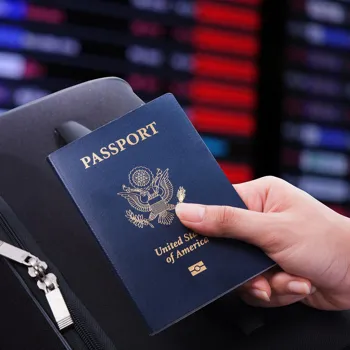Unraveling Travel Restrictions: Navigating Today's Complex Landscape. Dive into essential tips for seamless and safe adventures!
The world has become a smaller place, thanks to technology and increased
connectivity. However, planning a trip, whether for leisure or business, now involves more than just booking flights and accommodation.
Travel restrictions, constantly evolving due to global events and health concerns, can throw a wrench in even the most meticulously planned itineraries. Hence, understanding and navigating these regulations is key for the modern Indian traveler.
This guide aims to equip you with the knowledge and resources to travel smart and safe, minimizing potential disruptions and maximizing your travel experience.
From visa requirements and health protocols to understanding local laws and customs, we'll cover the essential aspects of navigating the complex landscape of international and domestic travel restrictions.
So, pack your bags, charge your devices, and get ready to embark on your next adventure, armed with the information you need to travel with confidence.
Thoroughly research travel restrictions before booking flights
Before you even dream of packing that suitcase or clicking "book" on that irresistible flight deal, a thorough reconnaissance of the travel restrictions in place for your chosen destination is paramount.
This isn't just a casual glance at a website; it requires diligent research from reliable and official sources. Begin with the official websites of the destination country's embassy or consulate in India.
These websites usually have a dedicated section for visa information, travel advisories, and any specific entry requirements. For instance, if you're planning a trip to Thailand, the Royal Thai Embassy in New Delhi's website should be your first stop.
Check MEA & Immigration websites for travel advisories & rules before departure
Next, consult the website of the Ministry of External Affairs (MEA) of India. The MEA provides travel advisories for Indian citizens traveling abroad, which can include warnings about potential risks, safety concerns, and important local regulations.

Also, check the website of the Bureau of Immigration for the latest updates on passport and visa rules applicable to Indian citizens. Remember, travel restrictions can change rapidly, sometimes with little notice.
Therefore, it’s crucial to keep checking for updates even in the days leading up to your departure. Print out or save screenshots of the relevant information, as this could be handy in case you encounter any issues during your travels.
A little bit of upfront research can save you a whole lot of headaches later on.
Understanding and navigating visa requirements for international travel
Visa requirements are often the first hurdle for international travelers. Understanding the specific visa needed for your purpose of travel (tourism, business, study, etc.) is crucial. Many countries offer different types of visas, each with its own set of requirements and validity periods.
Start by determining if you even need a visa. Some countries offer visa-free entry or visa-on-arrival options to Indian citizens for short stays.
A comprehensive list of visa requirements and visa-free countries for Indian passport holders can be found on various travel websites and forums, but always cross-reference this information with the official embassy or consulate website.
If a visa is required, start the application process well in advance. Visa processing times can vary significantly, depending on the country and the type of visa. Gather all the necessary documents carefully, ensuring that you meet all the stated requirements.
Common documents include a valid passport, application form, photographs, proof of accommodation, travel itinerary, and financial statements.
Ensure passport validity, apply early for visas, keep records, face immigration queries
Ensure your passport has sufficient validity, usually at least six months beyond your intended stay in the destination country. Submit your application well before your planned travel dates to avoid any last-minute delays.
Keep a copy of your visa application and supporting documents for your records. While online applications are becoming increasingly common, some countries still require in-person submissions at their embassy or consulate.
Lastly, remember that a visa only grants you permission to seek entry into a country, and the final decision rests with the immigration officer at the port of entry. Be prepared to answer questions about your purpose of travel and your intention to abide by the country's laws and regulations.
Stay informed about health regulations for international travel
Health regulations have become a significant factor in international travel in recent years. Before embarking on your journey, research the health requirements and recommendations for your destination.
This includes understanding any mandatory vaccinations, testing requirements, and quarantine protocols. Websites like the World Health Organization (WHO) and the Centers for Disease Control and Prevention (CDC) provide up-to-date information on global health risks and travel advisories.
Consult your doctor or a travel health clinic well in advance of your trip to discuss any necessary vaccinations or preventive medications. Ensure that your routine vaccinations are up-to-date.
Some countries may require proof of vaccination against specific diseases, such as yellow fever, especially if you are traveling from or transiting through certain regions.
Familiarize yourself with any specific COVID-19 related entry requirements, such as proof of vaccination, negative PCR test results, or health declarations.
Stay updated on travel requirements, carry medical records, prioritize health
These requirements can vary significantly from country to country and can change frequently, so stay updated on the latest protocols. Carry copies of your vaccination records and test results with you, both in paper and digital formats.
It's also wise to pack a basic medical kit with essential medications, pain relievers, and any personal prescriptions you may need. In addition to official regulations, consider your own health and safety.
Purchase travel insurance that covers medical expenses, including COVID-19 related treatment and repatriation. Be mindful of local health risks, such as mosquito-borne illnesses or foodborne diseases, and take appropriate precautions.
By prioritizing your health and staying informed about health regulations, you can travel with confidence and minimize potential health-related disruptions.
Understand local laws and customs for smooth travel
Beyond visas and health regulations, understanding local laws and customs is essential for a smooth and respectful travel experience.
Every country has its own unique set of laws, customs, and cultural norms, and it's important to be aware of these to avoid inadvertently breaking the law or causing offense.
Research the local laws regarding dress codes, alcohol consumption, photography in public places, and other aspects of daily life. Some countries have strict laws against activities that may be considered acceptable in India, such as public displays of affection or the use of recreational drugs.
Be particularly mindful of local customs and traditions, especially in religious or cultural sites. Dress modestly when visiting temples, mosques, or other places of worship. Learn a few basic phrases in the local language, such as "hello," "thank you," and "excuse me.
" This small gesture can go a long way in showing respect for the local culture.
Respect local customs and etiquette when traveling abroad
Be aware of local etiquette and social norms. For example, in some cultures, it's considered impolite to point your finger or show the soles of your feet.
Avoid discussing sensitive topics, such as politics or religion, with strangers, especially in countries where these topics are heavily regulated. Respect local customs regarding bargaining and tipping.
In some countries, bargaining is expected in markets and bazaars, while in others, it's considered rude. Tipping customs also vary widely, so research the appropriate tipping etiquette for restaurants, taxis, and other services.
By being mindful of local laws and customs, you can demonstrate respect for the local culture and avoid any misunderstandings or legal issues.
Stay connected while traveling for essential info and communication
Staying connected while traveling is crucial, not just for leisure but also for accessing important information and staying in touch with family and friends. Before you leave, check if your mobile phone plan offers international roaming or consider purchasing a local SIM card upon arrival.
A local SIM card can often be a more cost-effective option for making calls, sending texts, and accessing data. Download essential travel apps on your smartphone, such as maps, translation apps, currency converters, and ride-hailing services.
Google Translate and similar apps can be incredibly helpful for communicating with locals who don't speak your language. Ensure that you have access to reliable Wi-Fi.
Most hotels, cafes, and airports offer free Wi-Fi, but it's always a good idea to have a backup plan, such as a portable Wi-Fi hotspot or a data plan on your mobile phone.
Stay safe while traveling: Know emergency numbers, share itinerary, stay connected
Familiarize yourself with the local emergency numbers and the contact information for the Indian embassy or consulate in your destination country. In case of an emergency, you'll want to have these numbers readily available.
Share your travel itinerary with a family member or friend back home, and check in with them regularly. This will ensure that someone knows your whereabouts and can contact you in case of an emergency.
By staying connected and informed, you can enhance your safety and security while traveling and easily access important information when needed.
Travel insurance is essential for unforeseen events during travel
Travel insurance is non-negotiable in today's world. It provides a safety net against unforeseen circumstances, such as medical emergencies, trip cancellations, lost luggage, and other unexpected events.
Choose a travel insurance policy that covers a wide range of potential issues, including medical expenses, repatriation, trip interruption, and loss of personal belongings. Read the policy carefully to understand the coverage limits, exclusions, and claim procedures.
Ensure that your travel insurance covers COVID-19 related expenses, including medical treatment, quarantine costs, and trip cancellations due to travel restrictions. Carry a copy of your travel insurance policy with you, both in paper and digital formats.
In case of an emergency, you'll need to provide your insurance details to the hospital or service provider. Inform your family members or friends about your travel insurance policy and how to file a claim in case you are unable to do so yourself.
Travel insurance is an investment in your peace of mind.
Be prepared for emergencies on vacation to protect yourself financially
While hoping for a perfectly event-free vacation, and in case of an emergency, contact the local authorities immediately and seek assistance. If you encounter any issues with your passport or visa, contact the Indian embassy or consulate for guidance.
Keep receipts for all expenses incurred due to the emergency, as these will be required when filing a claim with your travel insurance company.
By being prepared for potential emergencies and purchasing comprehensive travel insurance, you can protect yourself against financial losses and ensure that you receive the assistance you need when you need it most.
AI Generated Content. Glance/InMobi shall have no liability for the content












